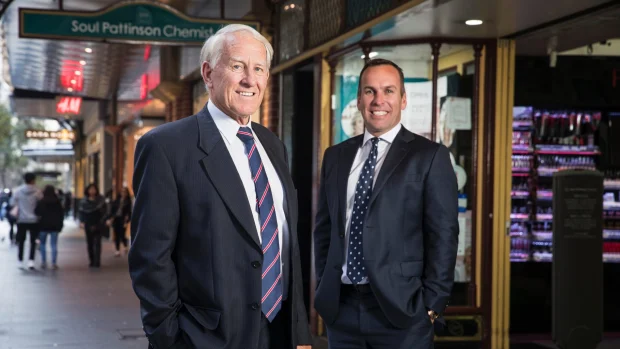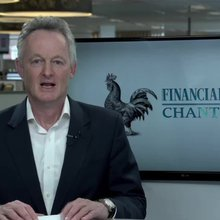Plain text link: https://www.afr.com/chanticleer/retail-investors-explain-soul-patts-and-brickworks-value-gap-20180920-h15mh4
Retail investors explain Soul Patts and Brickworks value gap
The two companies at the heart of the longest cross shareholding in Australian corporate history have reported full-year financial results which have reaffirmed a significant divergence in the way they are valued by the market.
It is a bit of a mystery why the two companies controlled by the Millner family, Washington H Soul Pattison and Co and Brickworks trade at vastly differently levels relative to the inferred value of their net assets.
Soul Patts shares trade at about the same as the value of its inferred net assets while Brickworks shares trade at about a 28 per cent discounts to its inferred net assets. Recent movements in share prices have changed the value of inferred net assets but the discount gap remains about the same.

Todd Barlow, chief executive, and Rob Millner, chairman of Washington H Soul Pattinson have defended the Brickworks cross shareholding. [photo: Louie Douvis]
Of course, the biggest shareholdings of each company are shares in each other. Soul Patts owns about 44 per cent of Brickworks which, in turn, owns about 43 per cent of Soul Patts.
One logical explanation for the discount to net assets gap is that Robert Millner and Todd Barlow at Soul Patts have been much better at attracting retail investors than Lindsay Partridge at Brickworks.
Millner, who is executive chairman of Soul Patts and Brickworks, says retail investors like investing in Soul Patts because of its dividend growth and its defensive qualities in times of volatility.
Soul Patts is one of only two companies listed on the ASX that has raised its dividend every year for the past 18 years. The other company is Ramsay Health Care.
'Look through' valuation
Barlow, who is chief executive of Soul Patts, spends a lot of his time speaking to media outlets and brokers reliant on retail investors.
He says that over the past three years Soul Patts has seen a 58 per cent increase in retail investors on its share register from about 12,000 to 19,000.
Millner says Partridge, who is chief executive of Brickworks, will be doing more to attract retail investors.
One of the long-standing criticisms of the Soul Patts/Brickworks shareholding structure has been around its governance including its family control.
But Partridge says the family-owned nature of the business has allowed it to do things other companies could not.
He says the Soul Patts subsidiary New Hope Corporation was able to sit on $1 billion in spare cash for seven years before buying Rio Tinto's 40 per cent ownership in the Bengall coal mine joint venture at the same time coal prices had bottomed.
"Only family companies can do that sort of thing," Partridge said.
Last year, fund manager Perpetual failed in a court action to break up the cross shareholding.
Partridge says that while it is true that Brickworks has now published a "look through" valuation of its investments for the first time, this had nothing to do with the Perpetual court action.
"We are trying to show the inherent value in the group," he says.
Barlow said the market did not seem to have appreciated that about $1 billion in value was added to Soul Patts' investment portfolio in the month of August.
Soul Patts governance
Soul Patts shares were trading at $23.90 on Thursday morning, which is just above the inferred value of net assets of about $22.72. But if you add in the market value increases in August, the inferred value of net assets is $27.22.
Brickworks shares were trading at $16.31 on Thursday morning compared to a value for its inferred assets of $21.66.
If retail investor interest explains the difference in the valuation of the two companies that would fit with the analysis of leading fund manager Peter Cooper from Cooper Investors.
He said in an interview with Livewire earlier this year that Soul Patts is very unpopular with proxy advisers and institutional investors because of its governance.
But he said it is run by independently minded people who invest when values are on offer and are "very conservative and risk-averse when risk is abundant".
by Tony Boyd, AFR, Chanticleer

--- ends ---
Sure, it's over 4 years old (penned in September 2018) but it does explain a fair bit - and I (for one) did find it interesting. I think my online subscription to the AFR is one of the better decisions I've made over the years. I highly recommend it. I think it's costing me $59/month currently, as my cheaper introductory offer has expired and now I'm paying full price, but that only works out to $13.62/week (or $708/year), so it is what it is. I think it's worth it anyway.




